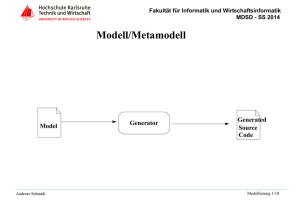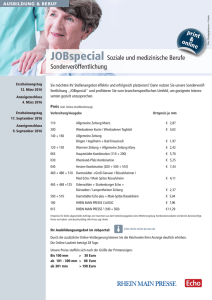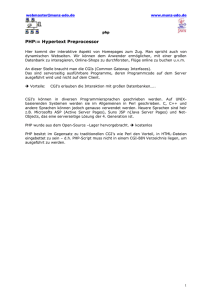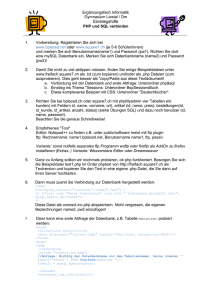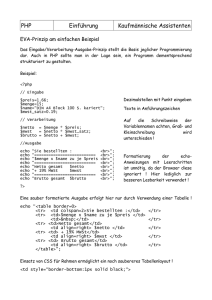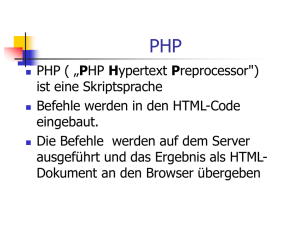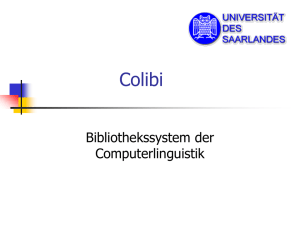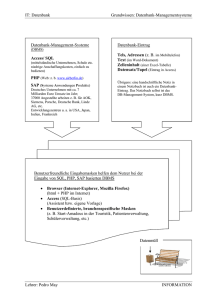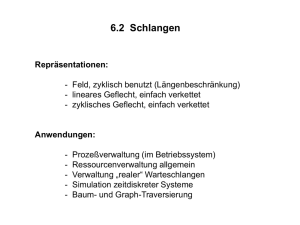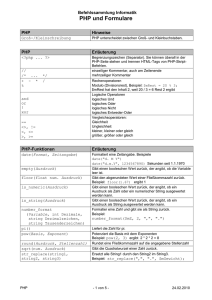PHP-Metamodell
Werbung
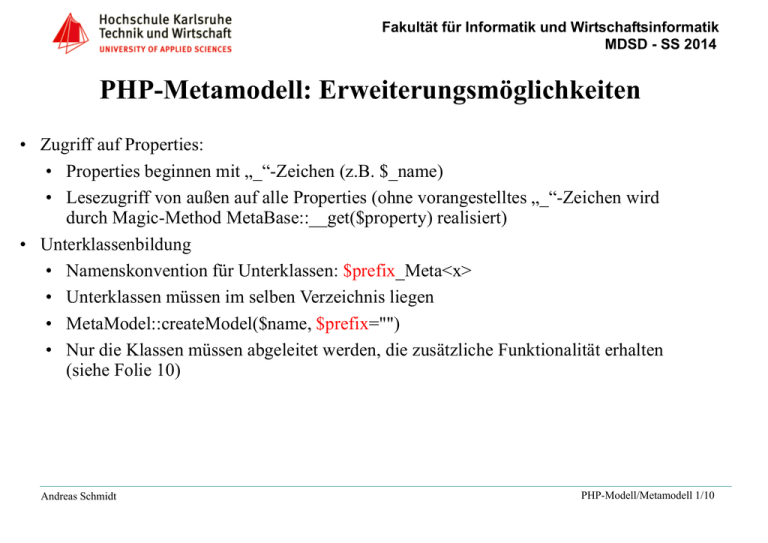
Fakultät für Informatik und Wirtschaftsinformatik
MDSD - SS 2014
PHP-Metamodell: Erweiterungsmöglichkeiten
• Zugriff auf Properties:
• Properties beginnen mit „_“-Zeichen (z.B. $_name)
• Lesezugriff von außen auf alle Properties (ohne vorangestelltes „_“-Zeichen wird
durch Magic-Method MetaBase::__get($property) realisiert)
• Unterklassenbildung
• Namenskonvention für Unterklassen: $prefix_Meta<x>
• Unterklassen müssen im selben Verzeichnis liegen
• MetaModel::createModel($name, $prefix="")
• Nur die Klassen müssen abgeleitet werden, die zusätzliche Funktionalität erhalten
(siehe Folie 10)
Andreas Schmidt
PHP-Modell/Metamodell 1/10
Fakultät für Informatik und Wirtschaftsinformatik
MDSD - SS 2014
Klassendiagramm
MetaBase
__get($property)
MetaType
MetaModel
_name
_classes
_relations
_source
_date
createModel(name)
addRelation($name)
addClass($name)
MetaClass
_name
_primary_key
_attributes
_relations
_model
MetaAttribute MetaRelationEnd
_name
_type
_length
_is_primary_key
_class
addAttributel(name, ...)getModel()
addRelationEnd(name, ...)
getModel()
_role
_type
_min
_max
_class
_relation_name
_name
_model
MetaRelation
_name
_relation_ends
_model
addRelationEnd($end)
Andreas Schmidt
PHP-Modell/Metamodell 2/10
Fakultät für Informatik und Wirtschaftsinformatik
MDSD - SS 2014
Ableiten der Metaklassen
warum ?
•
•
•
•
Meta-API soll Domäne sehr gut abbilden
zusätzliche Methoden/Properties erleichtern die Erstellung der Templates
Templates bleiben besser lesbar und wartbar
Jede Zielsprache hat ihre Eigenheiten
(z.B. Bezeichnung von Datentypen, Programmiersprachkonstrukte, ...)
• Pro Zielsprache eigenes Unterklassenmodul (z.B. SQL_Meta<x>, Java_Meta<x>, ...)
Andreas Schmidt
PHP-Modell/Metamodell 3/10
Fakultät für Informatik und Wirtschaftsinformatik
MDSD - SS 2014
Beispiel zur Unterklassenbildung:
Definition Modell
<?php
include_once 'meta-model.php';
$model = MetaModel::createModel('Film DB');
$p = $model->addClass('Person');
$p->addAttribute('id','Integer',10,true);
$p->addAttribute('name','String',30);
$p->addAttribute('vor_name','String',30);
$p->addAttribute('geburtstag','date');
$f = $model->addClass('Film');
$f->addAttribute('id', 'Integer',10, true);
$f->addAttribute('titel', 'String',50);
$f->addAttribute('jahr', 'date');
Andreas Schmidt
PHP-Modell/Metamodell 4/10
Fakultät für Informatik und Wirtschaftsinformatik
MDSD - SS 2014
Beispiel zur Unterklassenbildung
• zu generierender Code:
class CRUD_Person {
protected static $GET_ONE = "
SELECT id, name, vor_name, geburtstag
FROM Person
WHERE id = ?";
protected static $INSERT = "
INSERT INTO Person (id, name, vor_name, geburtstag)
VALUES (?, ?, ?, ?)";
protected static $DELETE_ONE = "...";
protected static $DELETE_ALL = "...";
protected static $UPDATE = "...";
protected static $GET_ALL = "...";
Andreas Schmidt
PHP-Modell/Metamodell 5/10
Fakultät für Informatik und Wirtschaftsinformatik
MDSD - SS 2014
• Template:
<?php foreach ($model->classes as $class): ?>
class CRUD_<?php echo $class->name ?> {
...
protected static $INSERT = "
INSERT INTO <?php echo $class->name ?>
(<?php for($idx=0; $idx < count($class->attributes); $idx++) {
echo $class->attributes[$idx]->name;
if ($idx < count($class->attributes)-1)
echo ", ";
} ?>)
VALUES (<?php for($idx=0; $idx < count($class->attributes); $idx++) {
echo "?";
if ($idx < count($class->attributes)-1)
echo ", ";
} ?>)";
...
Andreas Schmidt
PHP-Modell/Metamodell 6/10
Fakultät für Informatik und Wirtschaftsinformatik
MDSD - SS 2014
• Unterklasse
class SQL_MetaClass extends MetaClass {
function attribut_list($separator=",") {
for($idx=0; $idx < count($this->attributes); $idx++) {
echo $this->attributes[$idx]->name;
if ($idx < count($this->attributes)-1)
echo "$separator ";
}
}
function parameters($separator=",", $with_pk=true) {
for($idx=0; $idx < count($this->attributes); $idx++) {
if ($with_pk || ! $this->attributes[$idx]->is_primary_key) {
echo "?";
if ($idx < count($this->attributes)-1)
echo "$separator ";
}
}
}
}
Andreas Schmidt
PHP-Modell/Metamodell 7/10
Fakultät für Informatik und Wirtschaftsinformatik
MDSD - SS 2014
Definition Modell
<?php
include_once 'meta-model.php';
sucht nach Unterklassen
mit Prefix SQL_
$model = MetaModel::createModel('Film DB','SQL');
$p = $model->addClass('Person');
$p->addAttribute('id','Integer',10,true);
$p->addAttribute('name','String',30);
$p->addAttribute('vor_name','String',30);
$p->addAttribute('geburtstag','date');
$f = $model->addClass('Film');
$f->addAttribute('id', 'Integer',10, true);
$f->addAttribute('titel', 'String',50);
$f->addAttribute('jahr', 'date');
Andreas Schmidt
PHP-Modell/Metamodell 8/10
Fakultät für Informatik und Wirtschaftsinformatik
MDSD - SS 2014
• neues Template:
class CRUD_<?php echo $class->name ?> {
...
protected static $INSERT = "
INSERT INTO <?php echo $class->name ?>
(<?php $class->attribut_list() ?>)
VALUES (<?php $class->parameters() ?>)";
...
}
<?php endforeach ?>
Andreas Schmidt
PHP-Modell/Metamodell 9/10
Fakultät für Informatik und Wirtschaftsinformatik
MDSD - SS 2014
Anhang: Klassen Autoload Mechanismus
# when working with subclasses, not declared subclasses are loaded
# automatically or are silently created
nicht vorhandene,
#
gesuchte Klasse
function __autoload($class) {
if (preg_match('#(\w+_)(Meta\w+)#', $class, $match)) {
$file = $match[1].$match[2].".php";
existiert Datei mit
entsprechendem Namen ?
if (file_exists($file)) {
# load class $class from '$file'
include_once($file);
wenn ja, laden
} else {
# create class $class instantly (no file $file found)
eval ("class $class extends $match[2] {}");
}
}
}
wenn nicht, dynamisch erzeugen
(abgeleitet von entspr. Oberklasse)
Andreas Schmidt
PHP-Modell/Metamodell 10/10
